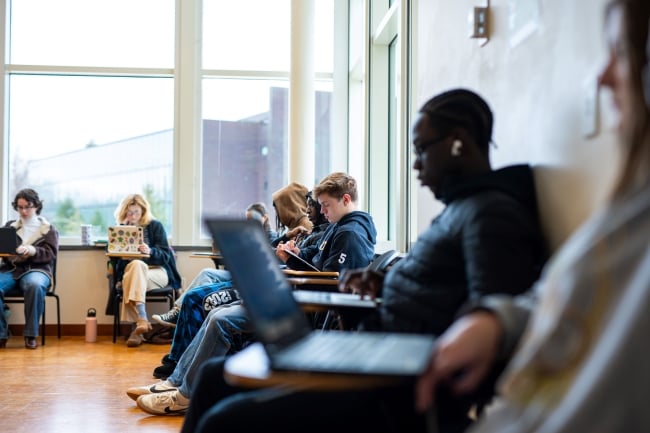You have /5 articles left.
Sign up for a free account or log in.

Students at Goucher College who fall below a 2.0 cumulative GPA are enrolled in a for-credit course to improve their academic skills and support their success in college.
Goucher College
For many students transitioning to college, thriving academically can be a challenge, either because the student is underprepared for college courses or they’re balancing other life responsibilities. A 2022 paper found, among students who ultimately earn a bachelor’s degree, 8 percent reported ever having been on academic probation.
Goucher College in Maryland created a new course in 2022 to help students struggling with their academics return to good standing and raise their overall GPA through earning credits. The course, Learning to Learn (LL 110), builds students’ confidence in their academic skills and helps them get back on track to succeed throughout their time at the college.
The background: In recent years, the college has seen a greater number of students in poor academic standing, which Isabel Moreno-Lopez, the associate provost for undergraduate studies, attributes in part to the COVID-19 pandemic as well as to increased mental health challenges, racial and social inequalities, and financial challenges for students.
At Goucher, students must earn a 2.0 GPA or above to remain in good academic standing. Anyone falling below that number in a single term is placed on academic warning and on academic probation if their cumulative GPA drops to 2.0.
Previously, students on academic probation would attend a two-day retreat before the start of the semester and meet regularly with an academic coach in the Academic Center for Excellence, explains Kimberly Meisel, director of academic advising and support. The model had some positive results, but there was a need for more in-depth education, which prompted leaders to create new initiatives.
How it works: Students in LL 110 meet twice a week, and Meisel serves as the course instructor, which allows her to engage with students regularly. While they are in the class, students can also receive help from an academic coach, a peer coach or a success adviser.
The first term, spring 2022, students on academic probation were required to participate, and those on academic warning were invited to, if they chose.
Starting in fall 2023, in addition to those on probation and warning, students could self-refer into the class if they wanted additional help, and other departments could refer students as well.
The number of sections the college offers each term varies—fall 2023, for example, had two sections with a total of 25 students, but spring 2023 had one section with 20 students enrolled.
Another Model of Support
York College offers a mentorship program for students on academic probation. Students are automatically assigned a mentor and arrange five meetings throughout the semester to set goals and receive accountability in their progress. Read more here.
The two-credit class covers cognitive-based study techniques, executive functioning skills, self-motivation, self-management and lifelong learning, among other topics. Student assignments include journal entries, presentations and a letter to the next term’s course participants, in which they reflect on their experiences prior to, during and following the class.
The impact: For spring 2023, 85 percent of students who enrolled in the class and passed (some students withdrew or failed because they didn't attend classes) improved their academic standing at the end of the term. Among these students, 55 percent achieved good academic standing and 30 percent moved up to a less serious infraction, from academic probation to academic warning. All students who participated in the course saw their cumulative GPAs rise.
The average cumulative GPA for students enrolled in LL 110 in spring 2023 prior to the course was 1.42, and the average at the end was 2.14.
In their letters to the next class, students have shared how they gained newfound confidence in their academic abilities, improved mental health and developed a community of peers who were dealing with the same issues.
In the future, Goucher staff plan to continue offering the course but are looking into ways to be more proactive in how it’s offered to students.
Do you have an academic success tip that might help others encourage student success? Tell us about it.



